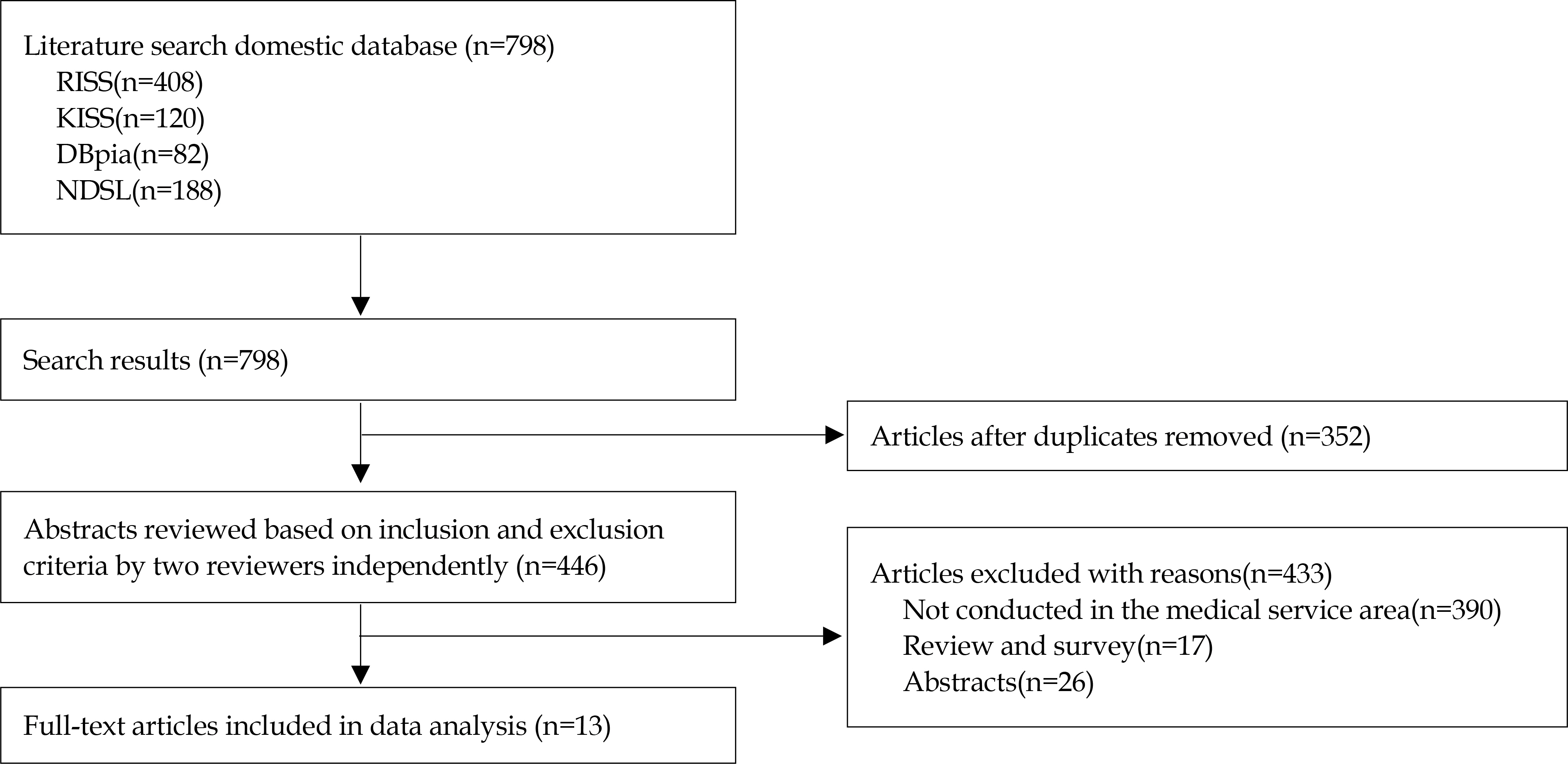J Korean Acad Nurs Adm.
2018 Jan;24(1):85-96. 10.11111/jkana.2018.24.1.85.
A Literature Review of Research on Medical Service Design in Korea
- Affiliations
-
- 1College of Nursing · Research Institute of Nursing Science, Chonnam National University, Korea.
- 2Department of Nursing, Nambu University, Korea.
- 3Department of Nursing, Mokpo National University, Korea. kimyunhee@mokpo.ac.kr
- KMID: 2403686
- DOI: http://doi.org/10.11111/jkana.2018.24.1.85
Abstract
- PURPOSE
Purpose of this study was to analyze research on the service design process applied to domestic medical service areas.
METHODS
A review was made through domestic databases including RISS, KISS, DBpia, and NDSL and for the analysis framework: a medical service classification code which integrated the medical service area and the design fields.
RESULTS
In the healthcare service field there were 9 studies (69.2%) in the medical area, 1 study (7.7%) each in nursing and oriental medicine, and 2 studies (15.4%) in healthcare. According to analysis results based on the medical service classification code, there were 5 studies in prevention and management, 6 studies in curative care, 1 each in rehabilitation and ancillary care. Double diamond process was used in 8 studies.
CONCLUSION
Service design was applied mainly to the curative care in the domestic medical settings but little research on service design in the long-term nursing care area was identified. As a strategy to improve the quality of nursing service, it is necessary to adopt the service design process for various nursing service areas in Korea.
MeSH Terms
Figure
Reference
-
References
1. Chae YM. The creative society, hospital service innovation implementing patient experience and service design strategies. Korean Journal of Hospital Management. 2014; 19(4):69–78.2. Korea Institution of Design Promotion. Healthcare design first aid kit [Internet]. Korea Institution of Design Promotion;2013. [cited 2017 January 10] Available from:. http://www.designdb.com/?menuno=790&bbsno=14683&siteno=15&act=view&ztag=rO0ABXQANDxjYWxsIHR5cGU9ImJvYXJkIiBubz0iNTkxIiBza2luPSJwaG90b19iYnMiPjwvY2FsbD4%3D.3. Kim CS, Nah K. A study on the utilization of open innovation platform co-creation as service design methodology: Focused on the case study of ‘OpenIDEO’ and ‘Quriky’. Journal of Digital Design. 2013; 13(1):333–342.4. Choi JM, Chun YD. A case study on healthcare service design-focused on service innovation current situation analysis in hospital. Journal of Korean Society of Communication Design. 2014; 23:199–208.5. Health Insurance Review & Assessment Service. Assessment of 1st patient experience in 2017 [Internet]. Wonju: Health Insurance Review & Assesment Service;2017. [cited 2017 October 16]. Available from:. http://www.hira.or.kr/dummy.do?pgmid=HIRAA020002000000&cmsurl=/cms/inform/01/1352915_27106.html.6. Design Council. The design process; What is the double diamond? [Internet]. London: Design Council;2015. [cited 2017 November 07]. Available from. http://www.designcouncil.org.uk/news-opinion/design-process-what-double-diamond.7. Moritz S. Service design-practical access to an evolving field. London: Stefan Moritz;2005. p. 156–159.8. Son JS. A service design study for medical materials supply system of operating room. [dissertation]. Seoul: Chung-Ang University;2016. p. 1–132.9. Jeon YO. The development of service design framework for the innovation of Korea's social problems. [dissertation]. Seoul: Hongik University;2016. p. 64–86.10. Rhi JM. An analysis of current research paradigm for service design in Korea. Journal of Digital Design. 2014; 14(2):417–426.11. Yoo MH, Kim EK. Case studies on service design-focus on process and methodology. Journal of Communication Design. 2012; 39:31–39.12. Nam BK. Business models for official development assistance using a service design methodology in health care. [dissertation]. Gimhae: Inje University;2014. p. 48.13. Designing healthcare services. Proceedings of 2014 Spring Conference of the Korean Society of Adult Nursing; 2014 June 20. Seoul: Korean Society of Adult Nursing;2014.14. Strategies for nursing management according to the 4th industrial revolution. Proceedings of 2017 Spring Conference of the Korean Academy of Nursing Administration. 2017 June 9. Seoul: Korean Academy of Nursing Administration;2017.15. Sequist TD, Schneider EC, Anastario M, Odigie EG, Marshall R, Rogers WH, et al. Quality monitoring of physicians: Linking patients' experiences of care to clinical quality and outcomes. Journal of General Internal Medicine. 2008; 23(11):1784–1790.
Article16. Lin MC, Hughes BL, Katica MK, Christi DZ, Plesk PE. Service design and change of systems: Human-centered approaches to implementing and spreading service design. International Journal of Design. 2011; 5(2):73–86.17. Lee JH, Kim CJ. Effect of doctor's patient-centered communication on the patient satisfaction and treatment outcomes: Focusing on mediating effect of patient participation. The Journal of the Korea Contents Association. 2013; 13(11):249–260. https://doi.org/10.5392/JKCA.2013.13.11.249.18. Ministry of the Interior and Safety (KO). Operations manual of Government 3.0 citizens policy design group. Seoul: Ministry of the Interior and Safety;2016.19. Lee KS, Kim YS, Choi JG, Kim SY. A study on service improvement of department store using service design methodologies. Journal of the Korea Service Management Society. 2015; 16(1):225–243.20. Heo YJ, Yoo MH. A study on service design process and methods from an innovation perspective-semantic resolution from an empirical study. Journal of Communication Design. 2013; 43:28–37.
- Full Text Links
- Actions
-
Cited
- CITED
-
- Close
- Share
- Similar articles
-
- Book Review: Healthcare Analytics for Quality and Performance Improvement
- Research Support Programs of the National Research Foundation of Korea
- Analysis of Research Trends in Korean Medical and Nursing Service Marketing
- A Systematic Review of Training That Use an Integrated Patient Simulator
- A Review of Community Health Nursing Research in Korea and Japan


